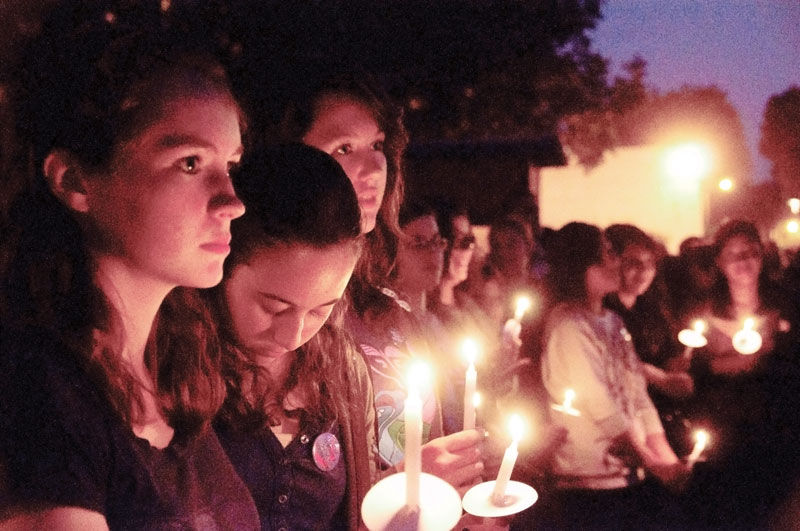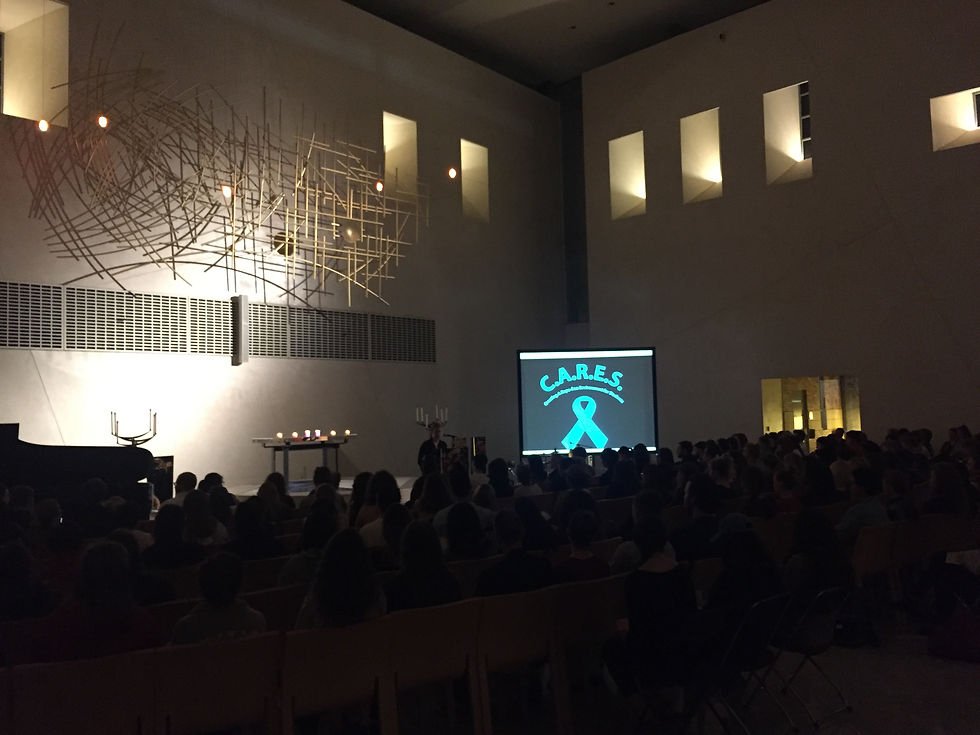Chapman University Takes Back the Night
- Deanna Tayag
- Mar 14, 2016
- 3 min read

Photo courtesy of Chapman PEER
Amber lights glowed within the hall, casting dark silhouettes against the speckled, opal walls of Chapman University’s Fish Interfaith Center. Approximately 100 survivors and allies sat in rows, some in silence; some, with heads lowered, sniffling, wiping away tears; and others, listening to speakers’ stories with a blaze in their eyes, looking fiercely ahead.
On March 1st, Chapman hosted its annual “Take Back the Night,” an event where stories of sexual assault, violence, and abuse, from both survivors and allies, were expressed in the forms of prose, poetry, and songs. It was an evening of vulnerability and of solidarity, as many of these brave speakers confided that this was their first time sharing their stories.
“Tonight, we want you to know that you are not alone,” director of PEER/Health Education and Rape Crisis Counselor, Dr. Dani Smith, stated during her introduction. This sentiment was echoed later in the evening by a student, who said, “We come together to share our stories and speak our truths.”
The heart of the evening was the open mic session. Members of the community were invited to come up to the podium and share their story in whatever way they chose, without fear of judgment or action from members within the audience. A safe space for survivors and allies to speak, some trembled, some went with heads held high and voices clear, and others sobbed, their cries echoing throughout the building -- but all moved the audience to tears with their words.
Photo courtesy of Chloé Arrouye

Approximately 25 survivors and allies shared their stories throughout the evening, ranging from molestation inflicted on a male student by his younger stepbrother; a transgender female being assaulted by her professor; a dance student being violated repeatedly by a recommended physical therapist; and many others, all of which were unnerving, heartbreaking, and empowering to hear.
A third year UC Irvine student, who wished to remain anonymous, was one of the brave individuals who shared her story for the first time. Repeatedly molested as a child by her babysitter, it was not until sexual education courses began at the age of nine that she realized what had been done to her, resulting in depression and a suicide attempt later in life.
When asked why she decided to share her story, she replied with an unwavering, tear-choked voice, “I told myself that, I think me being here tonight kinda shows that … it’s my time to start telling my story. I only told it for people that I felt like it would help them be stronger. But, this time, I did it for me. And, I feel like this is a step forward to healing myself now. After I said that, I felt really light, like, my chest was lighter. It was a great feeling.”
This broad scope of survivors and allies, all from within one community alone, further displayed that sexual assault does not discriminate: it can happen to anyone.
Between the set performers of poets and speakers, various Chapman students from their CARES (“Creating a Rape-Free Environment for Students”) organization on campus provided the audience with haunting facts regarding sexual assault, one of them being: 5% of women in college will experience rape or attempted rape. “Our culture still has a mistaken definition of what rape is,” one student read, “however, if you’re the one being raped, there is no gray area.” One later continued, her voice firm and powerful, “Sexual assault [is what] happens when an offender chooses to assault another human being.”
Cassidy Scanlon, a student, asked in her poem, “Why were we drafted in a war we were not prepared to fight?” And, indeed, sexual assault is an ongoing war, a “hidden epidemic” within our culture, as Dr. Smith explained. “We need to change our culture, we need to change our society -- this needs to stop. And, for me, the way to stop it is we have to keep talking about it. We have to keep talking about respect and consent,” she urged.
At the end of the evening, Dominique Stewart, a graduate student and survivor, performed her song, “The Light,” co-written with her roommate Kelsey Stoerck. In it, she called survivors “warriors,” and sang, “I can see the light / It’s burning bright / But I don’t believe that it’s time for me to go.” Of the message, she said, “I just want people to know that it’s okay, we’re all going to be okay -- we are survivors, we are warriors, and that we can leave the situation being the one in power.”
Chapman’s “Take Back the Night” was an evening of tragedy, loss, and pain -- but, it was also one of solidarity and hope. As one Chapman student relayed during her ending thoughts, “We must continue to speak out until it stops.
“Together, we can take back the night … and the day.”




Comments